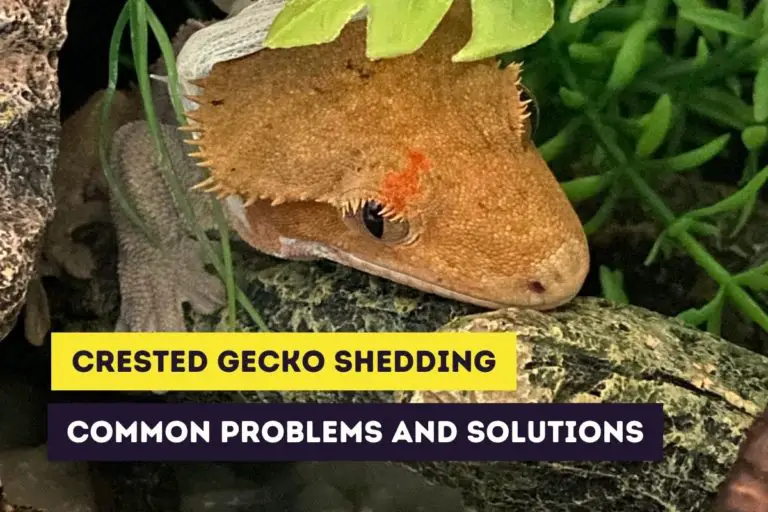Lifespan of Crested Geckos: Factors Determining Lifespan
Estimated reading time: 7 minutes
The crested gecko is a reptile that doesn’t have a short lifespan like other small pets. In fact, the lifespan of crested geckos is similar to that of larger pets like dogs and cats. When you’re interested in getting a crested gecko or when you already have one, you’ll want to know how long a crested gecko lives. The lifespan of a pet plays an important role when preparing for a pet.
Crested geckos in captivity have a lifespan between 15 and 20 years. There isn’t known a lot about the lifespan of crested geckos in the wild since they were rediscovered only a few decades ago. There are several factors that will influence the lifespan, such as genetics, care, and diet.
A crested gecko is a long-term commitment and you’ll need to be prepared to care for your crested gecko for almost two decades. But when you decide to get a crested gecko you won’t be disappointed. These little lizards are great to watch and are perfect pets for beginning herpetologists. You’ll want them around for as long as possible and this article is all about that.
If you’re interested in stickers or other products of crested geckos, you can always visit our Etsy Shop, which is called Artful Animalia. We currently only send stickers in the United States. If you’re interested in certain crested gecko-related products, don’t hesitate to contact us.
In this article, you’ll learn what the lifespan of crested geckos in the wild and in captivity is. You’ll learn what factors have an influence on the lifespan and how they influence it. Finally, you’ll get some tips and tricks to extend the lifespan of your crested gecko so it can live a long and healthy life.
This site contains affiliate links to products we recommend and use ourselves. We may receive a commission for purchases that you make through these links. If you’re interested in learning more about our affiliate links, please visit our (affiliate) disclaimer.
Crested Gecko Lifespan in the Wild
Crested geckos are relatively new as a pet and were just introduced as pets two decades ago. There’s still a lot of unexplored questions about the life of crested geckos in the wild. In the wild crested geckos are exposed to several dangers like predators and diseases.
Some sources claim that the lifespan of a wild crested gecko is around 4 to 5 years in the wild and that most wild crested geckos die in the first year. Since it’s not possible to determine the age of crested geckos in the wild after they’re fully grown, it’s currently impossible to say with certainty what the lifespan of crested geckos is in the wild.
Crested Gecko Lifespan in Captivity
The lifespan of a captive or pet crested gecko usually is between 15 and 20 years. This means that a crested gecko is a long-term commitment. So when you’re planning to buy a crested gecko you’ll need to consider whether or not your life is ready and settled for such a commitment.
Although a pet crested gecko won’t be exposed to the dangers of predators, it can get sick and can get attacked by other pets. But the main dangers in captivity that might lead to a short lifespan are improper care and a bad diet. I’ll explore both of these below in a second.
Important Factors That Determine The Lifespan
The most important factors that will determine the lifespan of your crested gecko are:
- genetic predisposition
- the way you care for your crested gecko
- the diet of your crested gecko
Genetics
Genetic predisposition to certain health issues is one of the main factors that determine the lifespan of any animal, including your crested gecko. Crested geckos are known to be prone to metabolic bone disease, just like other reptiles.
This disease is usually associated with a calcium deficiency, insufficient vitamin D3, or a combination of the two. The metabolic bone disease causes soft and bendable bones and should be treated as soon as possible.
It’s best to be aware that your crested gecko is susceptible to these health problems so you can try to limit the possibility of them coming up by giving a good diet.
Care
The lifespan of your crested gecko will be reduced when it’s doesn’t receive the proper care it deserves. To live a healthy and long life your crested gecko will need:
- appropriate housing
- a well-balanced diet (which I’ll take about later)
- the right temperature
- a humid vivarium
- regular visits to the vet
Appropriate housing
A common mistake that new crested gecko owners make is getting small and inappropriate housing. Crested geckos need a vertical enclosure that provides enough climbing and hiding possibilities. Luckily, there are a lot of brands that have different sizes of enclosures available to fit any need.
Make sure that you get a large enough enclosure with a proper substrate that’s suitable for crested geckos.
Right temperature
A crested gecko is happiest at moderate (room) temperatures. The ideal temperature for a crested gecko during the day ranges from 72 to 78 °F (22 to 25 °C). At night, the temperature can be lower, ranging between 69 and 74 °F (20 to 23 °C).
When the temperature is too high (above 85 °F / 29 °C) your crested gecko can get stressed and can get a heatstroke. When the temperature is too low (below 50 °F / 10 °C) your crested gecko will become lethargic and will lose its appetite. Low temperatures are a known cause for crested geckos to brumate (similar to hibernation) and should be avoided for long periods.
Humid vivarium
Crested geckos need a relative humidity of 70 to 80 percent in captivity. An average humidity that is higher than 80 percent will cause health problems in the long run. An average humidity that’s lower than 50 percent will cause dehydration and shedding problems.
If you want to learn how to create a humid vivarium you should definitely check this more extensive article about humidity.
Health problems and vet visits
Crested geckos can get a few “common” health problems that can usually be avoided. These health problems are:
- metabolic bone disease
- shedding problems
- parasites
- bacterial infections
When you notice signs of health issues, seek the help of an experienced vet. It’s also best to get your crested gecko a checkup each year.
Diet
Another important factor that has an influence on the lifespan of a crested gecko is the diet. Luckily this is the factor that you can adjust yourself. A well-balanced diet will keep your crested gecko healthy as long as possible and will prevent the development of a lot of diseases.
Crested geckos are omnivores and thrive on a diet of insects, fruits, and pollen in the wild. When you create your own diet consisting of fruit and insects you should make sure that the calcium-to-phosphorus ratio of the diet is 2:1. Otherwise, your crested gecko might develop health issues, like a metabolic bone disease.
Luckily, there exist many good commercial diets for crested geckos in captivity. Many crested geckos have been raised with meal replacement powders or pellet food that is made just for them. These powders and pellets provide your crested gecko with a well-balanced diet. They can also be supplemented with insects and the occasional fruit as a treat.
Vitamin and mineral supplements are generally not needed because the commercial diet already contains them. However, when you feed insects like crickets or worms you should gut-load and dust them.
Tips and Tricks for a Long Crested Gecko Lifespan
Although pet crested geckos already have a long lifespan, you can take some measures to extend the lifespan of your little lizard. Follow these tips and tricks to enhance your crested gecko’s life so it can live a long and healthy life:
- get your crested gecko from a reputable breeder or pet store that can give more information about the lineage of the crested gecko
- feed your crested gecko a well-balanced commercial diet and refrain from giving too much fruit or fatty worms
- find an experienced vet that can help you when your crested gecko gets sick or injured
- never grab your crested gecko by its tail as this will cause an instinctive defense mechanism (although it doesn’t increase the lifespan, it is a stressful situation)
- females get stressed when breeding so consider a cool down period so the female crested gecko can get rest and regain strength
- make sure that your crested gecko has a large enough enclosure
- never force your crested gecko to swim or give it a water bath
Want to Learn More?
If you want to learn more about crested geckos as pets, please read the following articles.
If you’re interested in getting crested geckos as pets you should also definitely read our article about baby and juvenile crested gecko care or (adult) crested gecko care.







